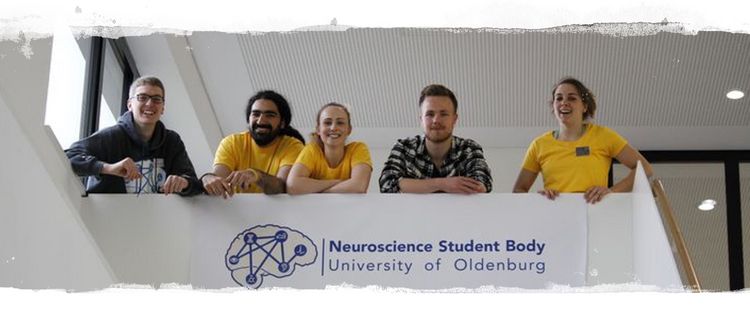Career
Career
Here you can find information about career opportunities with a master's degree in neuroscience.
Career Day
Every year, we organize a career day together with the study program 'Neurocognitive Psychology' and Ph.D. students of the program 'Neurosensory Science and Systems'. There we give guidance and ideas how steps into the future career could look like. We invite external and internal speaker to give insights into their career path. We hope that some of you gain new ideas for future plans and feel inspired to also look aside from the straight path of academia.
Find more information on the website of the Career Day Neuroscience!

Career Opportunities
All neuroscientists are created unequal.
Depending on your area of specialization, different job opportunities arise. In the broadest sense, you can choose between a career in academia or in the private sector.
For many, pursuing a career as a scientist, either at an institute or a university is straightforward and does not need any further explanation. But you would be surprised, how many different positions are present in research environments: professors, science managers, science journalists, technical science supporters etc. It is worth tracking the job ads of your preferred working groups and checking out the career pages of institutes to get an overview of the plethora of jobs they offer. In Germany, well-known institutes comprise “Fraunhofer” or “Max Planck”, just to give you an idea where you might start your online research. We do not have any predisposition towards these institutes. They just serve as examples. There are many more institutes with similar qualities.
Getting a job in the private sector is also an often-overlooked opportunity. From personal experiences, we can make the broad-brush statement that the great majority of companies have not included neuroscientists in their target audience. This is, however, rather a lack of awareness on their part than a lack of demand for neuroscientists. Here, it is important that you can give a good account of yourself and sell your abilities to the company. How does your expertise translate to the job you are interested in? How does the company benefit from your skills? For those cases, unsolicited applications are the way to go. Ideally, you made contacts with the hiring staff of the company beforehand, e.g. by attending a career fair. There are plenty of examples of students working in data science jobs because they focused on computational neuroscience or did a lot of data analysis in their studies. Statistical learning and machine learning, in general, are also great skills to have to kick-start a career in literally any field that asks for it. Furthermore, marketing departments are often keen on perception and evoked emotions of campaigns, with “neuroaesthetics” being the keyword here. If you are specializing in the processing of sensory information or behavioral neuroscience, you might want to check for that. Research and development departments also hire scientists to develop new technologies and push forward new projects. If the area of application is right for you, consider this too. Particularly, Biotech companies need staff for drug design and development. So, if you know about psychopharmacology, your chances are good to find a position there. To give a last example, if you have an extensive wet lab history, you could go to companies that study the quality of tap water, or that design vectors for genetic experiments. Be creative in how you can apply the wisdom the program gave you to different fields. Detach yourself from thinking that you will be doing the same kind of work in your job that you learned in your neuroscience program. Especially as far as working in commercial positions is concerned: If you need 5% of what you learned in your master’s degree, that is already a lot.
The high-risk takers can try to build their own start-up. The University of Oldenburg takes pride in being awarded Germany’s best-supporting university in guiding and assisting the founding of student-run businesses. The offers of the “Gründungs- und Innovationszentrum (GIZ)” might be an address for you, then.
If you are overwhelmed by the decision, you can go to the “Karriereberatung” to get some guidance and hopefully inspiration. Another Oldenburg-specific option is the “Innovative Hochschule Jade-Oldenburg (IHJO)”. Their services are free and consist of structured contact seminars, practical periods alongside your studies, mentoring programs and workshops with companies, institutions etc. It is free to attend these events and more information can be found on their website.
It is highly advised to actively look for job opportunities. Build yourself a network, talk to professors, PhD students and other people in your field of interest! There is no such way as a linear career path, especially in the just-so emerging field of Neuroscience. Go to general career fairs of the university or to neuroscience-specific fairs, visit conferences to meet new people and be inspired by their careers. Don’t just walk passively through your master’s program! Be proactive!
(May 2019 - Dominik Kessler)


